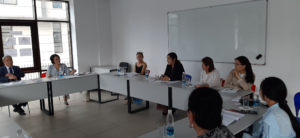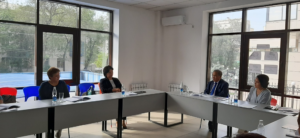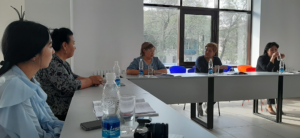The Role of Women in Central Asia: Trends and Prospects
2020 - November
The topic of the fifth roundtable was “The Role of Women in Central Asia: Trends and Prospects”. Author: Ms.Perizat Suranova, President of the Public Foundation “Kanykey Ene”, member of the political council of the political party “Zamandash”, member of the working group on improving the electoral legislation of the Kyrgyz Republic by decree of the President of the Kyrgyz Republic, specializes in issues of socio-economic development, political participation of women.
 This publication reflected the role of women in Central Asia: trends and prospects, progress made, some of the unresolved issues in achieving gender equality in the social, economic and political spheres. The publication brought together concrete examples, the best practices and good practices from Central Asian countries. The publication examined the participation of women in the social life of society, business, the work of parliaments and political parties, in elections and politics at different levels. This included the participation of women in political life, in the context of the status of women in society as a whole.
This publication reflected the role of women in Central Asia: trends and prospects, progress made, some of the unresolved issues in achieving gender equality in the social, economic and political spheres. The publication brought together concrete examples, the best practices and good practices from Central Asian countries. The publication examined the participation of women in the social life of society, business, the work of parliaments and political parties, in elections and politics at different levels. This included the participation of women in political life, in the context of the status of women in society as a whole.
The relevance of the publication lies in the fact that it tried to fill the existing gap in the study of place and role of women in political life of Central Asian countries. The problems raised in the publication stem from the daily practice of building a renewed region. In this regard, this work is important, but it is also necessary in practical terms. It is also associated with the need to create favorable conditions for the participation of women in political life of society. Of considerable importance are the recommendations proposed by the author on improving the means and methods of increasing the business and civic activity of women in the republic.
Central Asia consists of five countries. The diversity of the region is expressed in the multiplicity of its ethnic groups, languages and religions. Moreover, the region has its own special history of development, implementing 28 years of fundamental, political and socio-economic reforms in connection with the collapse of the Soviet Union and the transition from a planned to a market economy.

One of the main aspirations of people during the transition period to democratic rule and a market economy was the hope of expanding the opportunities for citizens to participate in life of society, which they will create and enjoy its benefits. Citizens should be represented at all levels and in all areas of decision-making so that their voice is heard by decision makers, and so that the decisions are made considering a wider range of opinions, which means that they are more effective. In addition, the transition period in the economic, social and political life of the region led to the elimination of state’s monopoly on ensuring gender equality. Women found themselves in an open environment with new conditions in relation to equality with more opportunities and dangers.
With the collapse of the Soviet Union, new borders formed and new social, economic and political, opportunities were created as well. For 28 years of independence, in order to assert their rights, women had to overcome great obstacles due to the difficult political and social situation.
The role of women is growing dynamically in all areas of society. No one disputes that this is a global trend. Women, not only an integral part of the historical process, but also its increasingly significant driving force.
So, what is the role of women in modern Central Asia? It consists not only in fulfilling her direct duties at work, but also in realizing herself as a good mother, an exemplary wife and mistress. The main principle for any woman was the ability to comply with the rule of the “golden mean”; Women have a very honorable and important role in society. After all, with her kindness and attitude, she softens conflicts and channel male power and energy in a
positive direction. If society succeeds not only in raising the position of women, but also in equalizing its importance in building society, then many problems will be solved.

RECOMMENDATIONS
For the formation of a balanced state policy, parity democracy in the countries of Central Asia, for the promotion of female leadership, it is necessary to maximize relevant activities, which is expressed in the following:
1. To create sustainable and transparent democratic institutions and ensuring the rule of law. The definition and practice of such activities include the exercise by women of leadership and authority along with men.
2. To ensure equal and real participation in political life, based on the principles of society, including all citizens, in which everyone has an equal right to vote, to run for office, and the government represents the interests of citizens.
3. Further reform of civil society institutions is required, which will contribute to greater activity of the women’s movement, will be the vehicle of gender policy in the state, their development and consolidation as a social base.
4. The state policy on women should not exclude the international aspect, fulfill the international obligations of states in connection with the ratification of relevant international conventions, and actively cooperate in the framework of international organizations.
5. The study of foreign practice suggests that it is necessary to fully consider modern challenges, namely, the increasing globalization of gender inequality, as a result of which the trafficking of women, prostitution, drug addiction and poverty are increasing.
6. The use of media to strengthen the role of women in public and economic life and to prevent stereotypes that form a negative attitude towards women and contribute to the strengthening of gender prejudice.
7. Strengthening political parties, as they are a kind of springboard for political positions and the key to promoting women’s full participation in political processes. Parties should not only include women on equal terms in party lists of candidates, but also actively implement internal party democracy and support women leaders (selection, training, provision of
resources for propaganda, fundraising, networking, as well as opportunities and ways to influence government policy, etc.).
8. For the governments of Central Asian region, it is necessary to systematically form a reserve of women leaders, not only from public servants, but from the ranks of NGOs, representatives of international organizations and business. This list should be open and accessible to all interested parties; political parties, state organizations and executive authorities.
9. Introduction of temporary special measures (in the form of a 30% quota for the representation of women in government), which are aimed at accelerating the establishment of de facto equality between men and women are not considered as discrimination or infringement of democracy.
10. Promotion of entrepreneurship and business development among women with access to borrowed funds, capital markets and finance.
11. Formation of women’s assets through access to land and property rights.
12. Improving the financial and political literacy of women.
13. Providing better jobs for women and raising wages, improving working conditions and the system of benefits.
This event was sponsored by The Nippon Foundation (TNF) and Japan Central Asia Friendship Association (JACAFA)







